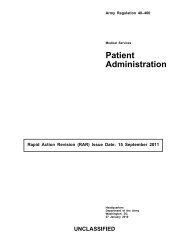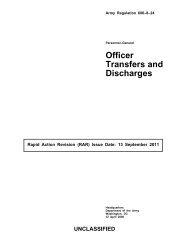AR 600-20, Army Command Policy - Army Publishing Directorate ...
AR 600-20, Army Command Policy - Army Publishing Directorate ...
AR 600-20, Army Command Policy - Army Publishing Directorate ...
Create successful ePaper yourself
Turn your PDF publications into a flip-book with our unique Google optimized e-Paper software.
courtesies listed in <strong>AR</strong> <strong>600</strong>–25, appendix A, should be rendered the national colors and national anthem at public<br />
events whether the Soldier is off or on duty, whether he or she is in or out of uniform. Intentional disrespect to the<br />
national colors or national anthem is conduct prejudicial to good order and discipline and discredits the military<br />
Service.<br />
4–4. Soldier conduct<br />
a. Ensuring the proper conduct of Soldiers is a function of command. <strong>Command</strong>ers and leaders in the <strong>Army</strong>,<br />
whether on or off duty or in a leave status, will—<br />
(1) Ensure all military personnel present a neat, soldierly appearance.<br />
(2) Take action consistent with <strong>Army</strong> regulation in any case where a Soldier’s conduct violates good order and<br />
military discipline.<br />
b. On public conveyances in the absence of military police, the person in charge of the conveyance will be asked to<br />
notify the nearest military police and arrange to have them, if necessary, take custody of military personnel. In serious<br />
situations, such as physical assault, the person in charge of the conveyance will be asked to stop at the first opportunity<br />
and request local police assistance. In all such cases, the local police will be advised to telephone (collect) the nearest<br />
<strong>Army</strong> post or <strong>Army</strong> headquarters.<br />
c. When an offense endangering the reputation of the <strong>Army</strong> is committed elsewhere (not on a public conveyance)<br />
and military police are not available, civilian police will be requested to take appropriate action.<br />
d. When military police are not present, the senior officer, WO, or NCO present will obtain the Soldier’s name,<br />
grade, social security number, organization, and station. The information and a statement of the circumstances will be<br />
sent to the Soldier’s commanding officer without delay. If the Soldier is turned over to the civilian police, the above<br />
information will be sent to the civilian police for transmittal to the proper military authorities.<br />
4–5. Maintenance of order<br />
<strong>Army</strong> and Marine Corps military police, Air Force security police, and members of the Navy and Coast Guard shore<br />
patrols are authorized and directed to apprehend Armed Forces members who commit offenses punishable under the<br />
UCMJ. Officers, WOs, NCOs, and petty officers of the Armed Forces are authorized and directed to quell all quarrels,<br />
frays, and disorders among persons subject to military law and to apprehend participants. Those exercising this<br />
authority should do so with judgment and tact. Personnel so apprehended will be returned to the jurisdiction of their<br />
respective Service as soon as practical. Confinement of females will be according to <strong>AR</strong> 190–47.<br />
4–6. Exercising military authority<br />
a. Military authority is exercised promptly, firmly, courteously and fairly. <strong>Command</strong>ers should consider administrative<br />
corrective measures before deciding to impose nonjudicial punishment. Trial by court-martial is ordinarily<br />
inappropriate for minor offenses unless lesser forms of administering discipline would be ineffective (see MCM, Part<br />
V, and chap 3, <strong>AR</strong> 27–10).<br />
b. One of the most effective administrative corrective measures is extra training or instruction (including on-the-spot<br />
correction). For example, if Soldiers appear in an improper uniform, they are required to correct it immediately; if they<br />
do not maintain their housing area properly, they must correct the deficiency in a timely manner. If Soldiers have<br />
training deficiencies, they will be required to take extra training or instruction in subjects directly related to the<br />
shortcoming.<br />
(1) The training, instruction, or correction given to a Soldier to correct deficiencies must be directly related to the<br />
deficiency. It must be oriented to improving the Soldier’s performance in his or her problem area. Corrective measures<br />
may be taken after normal duty hours. Such measures assume the nature of training or instruction, not punishment.<br />
Corrective training should continue only until the training deficiency is overcome. Authority to use it is part of the<br />
inherent powers of command.<br />
(2) Care should be taken at all levels of command to ensure that training and instruction are not used in an<br />
oppressive manner to evade the procedural safeguards applying to imposing nonjudicial punishment. Deficiencies<br />
satisfactorily corrected by means of training and instruction will not be noted in the official records of the Soldiers<br />
concerned.<br />
4–7. Disciplinary powers of the commanding officer<br />
a. <strong>Command</strong>ing officers exercise broad disciplinary powers in furtherance of their command responsibilities. Discretion,<br />
fairness, and sound judgment are essential ingredients of military justice.<br />
b. <strong>Command</strong>ers will familiarize themselves with their powers and responsibilities as outlined in MCM, <strong>AR</strong> 27–10,<br />
<strong>AR</strong> <strong>600</strong>–37, <strong>AR</strong> 635–<strong>20</strong>0, and other authorities. Legal advice is available from supporting judge advocates.<br />
c. Disciplinary measures are tailored to specific offenses and individual offenders. <strong>Command</strong>ers will neither direct<br />
subordinates to take particular disciplinary actions, nor unnecessarily restrict disciplinary authority of subordinates (see<br />
UCMJ, <strong>AR</strong>T. 37, and <strong>AR</strong>T. 98, and <strong>AR</strong> 27–10 regarding the proper exercise of authority by commanders).<br />
<strong>AR</strong> <strong>600</strong>–<strong>20</strong> 18 March <strong>20</strong>08<br />
23
















